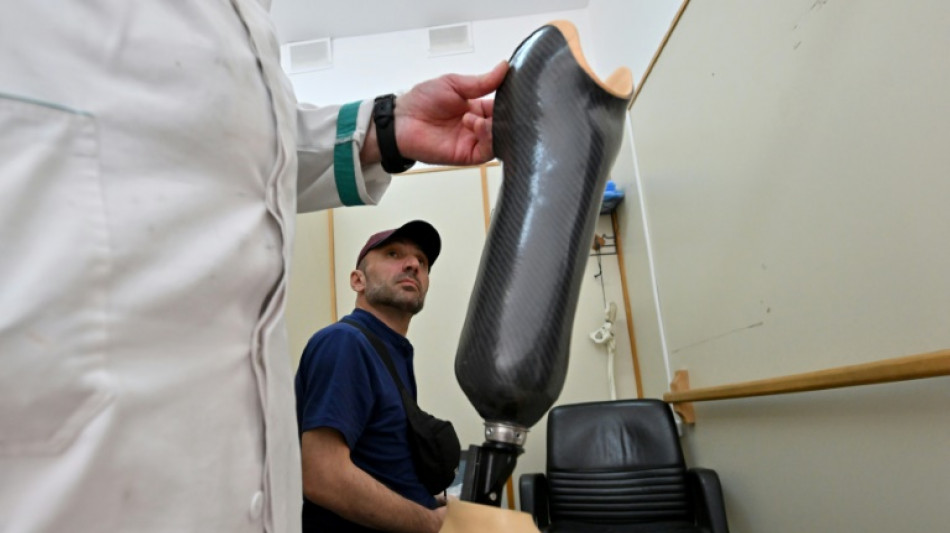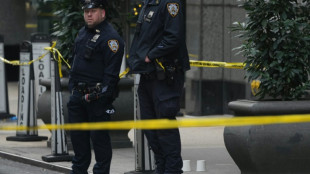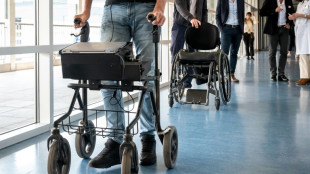
-
 South Korea president clings to power after martial law U-turn
South Korea president clings to power after martial law U-turn
-
Presidential vote seen as referendum on Romania's European future

-
 Hamilton bids farewell to Mercedes as Ferrari vie for title
Hamilton bids farewell to Mercedes as Ferrari vie for title
-
New Zealand unchanged in bid to hit back against England

-
 Macron seeks remedy to France's political crisis
Macron seeks remedy to France's political crisis
-
New Natalia Lafourcade album celebrates music's onstage evolutions

-
 Taiwan's Lai kicks off visit to US territory Guam
Taiwan's Lai kicks off visit to US territory Guam
-
Ivory Coast staple cassava meal gains UNESCO heritage status

-
 OpenAI to partner with military defense tech company
OpenAI to partner with military defense tech company
-
Liverpool held but Slot salutes 'special' Salah

-
 Man City needed to break losing 'routine', says Guardiola
Man City needed to break losing 'routine', says Guardiola
-
Leipzig down Frankfurt to reach German Cup quarters, Cologne strike late

-
 Mbappe admits penalty miss 'big mistake' as Bilbao beat Real Madrid
Mbappe admits penalty miss 'big mistake' as Bilbao beat Real Madrid
-
'Sad, disappointed' Mbappe pays penalty as Bilbao beat Real Madrid

-
 US stocks surge to records, shrugging off upheaval in South Korea, France
US stocks surge to records, shrugging off upheaval in South Korea, France
-
Liverpool held in Newcastle thriller, Arsenal inflict Amorim's first defeat

-
 Shiffrin confirms she'll miss Beaver Creek World Cup races
Shiffrin confirms she'll miss Beaver Creek World Cup races
-
Corner kings Arsenal beat Man Utd to close gap on Liverpool

-
 Mbappe pays penalty as Bilbao beat Real Madrid
Mbappe pays penalty as Bilbao beat Real Madrid
-
NFL Jaguars place Lawrence on injured reserve with concussion

-
 North Korea, Russia defence treaty comes into force
North Korea, Russia defence treaty comes into force
-
Openda hits brace as Leipzig beat Frankfurt in German Cup last 16

-
 Schar punishes Kelleher blunder as Newcastle hold Liverpool in thriller
Schar punishes Kelleher blunder as Newcastle hold Liverpool in thriller
-
De Bruyne masterclass helps Man City end seven-game winless streak

-
 Syrian rebels surround Hama 'from three sides', monitor says
Syrian rebels surround Hama 'from three sides', monitor says
-
Lawyers seek leniency for France rape trial defendants, blaming 'wolf' husband

-
 OpenAI chief 'believes' Musk will not abuse government power
OpenAI chief 'believes' Musk will not abuse government power
-
Thousands rally in Georgia after police raid opposition offices

-
 S. Korea opposition push to impeach president
S. Korea opposition push to impeach president
-
Powell 'not concerned' US Fed would lose independence under Trump

-
 French government falls in historic no-confidence vote
French government falls in historic no-confidence vote
-
Syrian White Helmets chief 'dreams' of never pulling a body out of rubble again

-
 NBA Suns lose Durant for at least a week with ankle injury
NBA Suns lose Durant for at least a week with ankle injury
-
Warhammer maker Games Workshop enters London's top stocks index

-
 Iran Nobel winner released for three weeks, 'unconditional' freedom urged
Iran Nobel winner released for three weeks, 'unconditional' freedom urged
-
Red Cross marks record numbers of humanitarians killed in 2024

-
 Johnson's Grand Slam 'no threat', says World Athletics boss Coe
Johnson's Grand Slam 'no threat', says World Athletics boss Coe
-
Qatar's emir and UK's Starmer talk trade as state visit ends

-
 Cuba suffers third nationwide blackout in two months
Cuba suffers third nationwide blackout in two months
-
Russia, Ukraine to send top diplomats to OSCE summit in Malta

-
 Spanish royals to attend memorial service for flood victims
Spanish royals to attend memorial service for flood victims
-
LPGA, USGA new policy requires female at birth or pre-puberty change

-
 Stick to current climate change laws, US tells top UN court
Stick to current climate change laws, US tells top UN court
-
British Museum chief says Marbles deal with Greece 'some distance' away

-
 Pope Francis receives electric popemobile from Mercedes
Pope Francis receives electric popemobile from Mercedes
-
Gaza civil defence: thousands flee Israeli strikes, evacuation calls

-
 Trump names billionaire private astronaut as next NASA chief
Trump names billionaire private astronaut as next NASA chief
-
Pidcock to leave INEOS Grenadiers at end of season

-
 Seoul stocks weaken, Paris advances despite political turmoil
Seoul stocks weaken, Paris advances despite political turmoil
-
South America summit hopes to seal 'historic' trade deal with EU


Despite losing leg in Mariupol, fighter eyes return to Ukraine frontline
In a small orthopaedic clinic in Kyiv, Daviti Suleimanishvili listens as doctors describe various prostheses that could replace his left leg, torn off during the battle for Mariupol.
Born in Georgia but with Ukrainian citizenship, Suleimanishvili -- whose nom-de-guerre is "Scorpion" -- is one of countless people who have lost arms or legs in the war and now impatiently awaiting a replacement limb.
A member of the Azov regiment, he was based in the city of Mariupol, which underwent a relentless battering by Russian forces for three months before the last troops at the Azovstal steelworks finally laid down their arms last week.
He was badly wounded on March 20 when a Russian tank located about 900 metres away fired in his direction.
"The blast threw me four metres and then a wall fell on top of me," he told AFP, saying he was also hit by shrapnel.
"When I tried to stand up, I could not feel my leg. My hand was injured and a finger was gone."
Carried by his comrades into a field hospital in the heart of the sprawling steelworks, his leg was amputated just below the knee.
He was then evacuated by helicopter to a hospital in Dnipro in central Ukraine.
Two months later he's getting around with crutches and hopes to soon have a prosthetic leg fitted, funded by the Ukrainian government.
"If possible, I want to continue serving in the army and keep fighting," he explains.
"A leg is nothing because we're in the 21st century and you can make good prostheses and continue to live and serve," he says.
"I know many guys in the war now have prostheses and are on the front lines."
- Resources needed -
On Wednesday afternoon, he had his first consultation with the medics who will fit him with a new limb.
Inside the clinic at a rundown building in Kyiv, a dozen specialists are making prosthetic limbs inside a workshop covered in plaster, while in the consultation rooms, doctors are considering which might be the right model for each of their patients.
But Suleimanishvili's case is not so straightforward.
One suggests a vacuum-attached prosthesis in which a pump draws out the air between the residual limb and the socket, creating a vacuum; another pushes for a different type of attachment which he says would be better for war-time conditions, that is "stable, flexible and easy to clean".
"There were almost no military people two weeks ago, but now they're coming," explains doctor Oleksandr Stetsenko, who heads the clinic.
"They weren't ready before as they needed to be treated for injuries to other parts of their bodies."
President Volodymyr Zelensky said in mid-April that 10,000 soldiers had been wounded while the United Nations has given a figure of more than 4,600 injured civilians.
Amplitude Magazine, a specialist American publication aimed at amputees, said Ukraine would need significant resources.
"To assist the hundreds or thousands of Ukrainian amputees who reportedly need treatment, aid volunteers will need to work from centralised locations that are well stocked," it said.
However, "there are a limited number of such clinics within Ukraine, and the supply chains that serve them are spotty at best."
- 'Up and running in weeks' -
Stetsenko said Ukraine has around 30 facilities that made prostheses, with his own clinic normally producing around 300 every year.
The clinic won't be able to step up production because each prosthesis is "customised" to suit the injury and needs of each patient.
In the case of Suleimanishvili, who is a gunner, the doctors will add 15 kilogrammes to the weight of his new leg so it can support his use of heavy weaponry.
"I want the prosthetic so I can do most manoeuvres," he insists.
In a week's time, he will be back to have a temporary prosthesis fitted so he can start learning to walk.
"In two or three weeks, he will be running," another doctor, Valeri Nebesny, told AFP, saying that like Suleimanishvili, "90 percent" of military amputees want to get back to the battlefield as quickly as possible.
M.Odermatt--BTB




